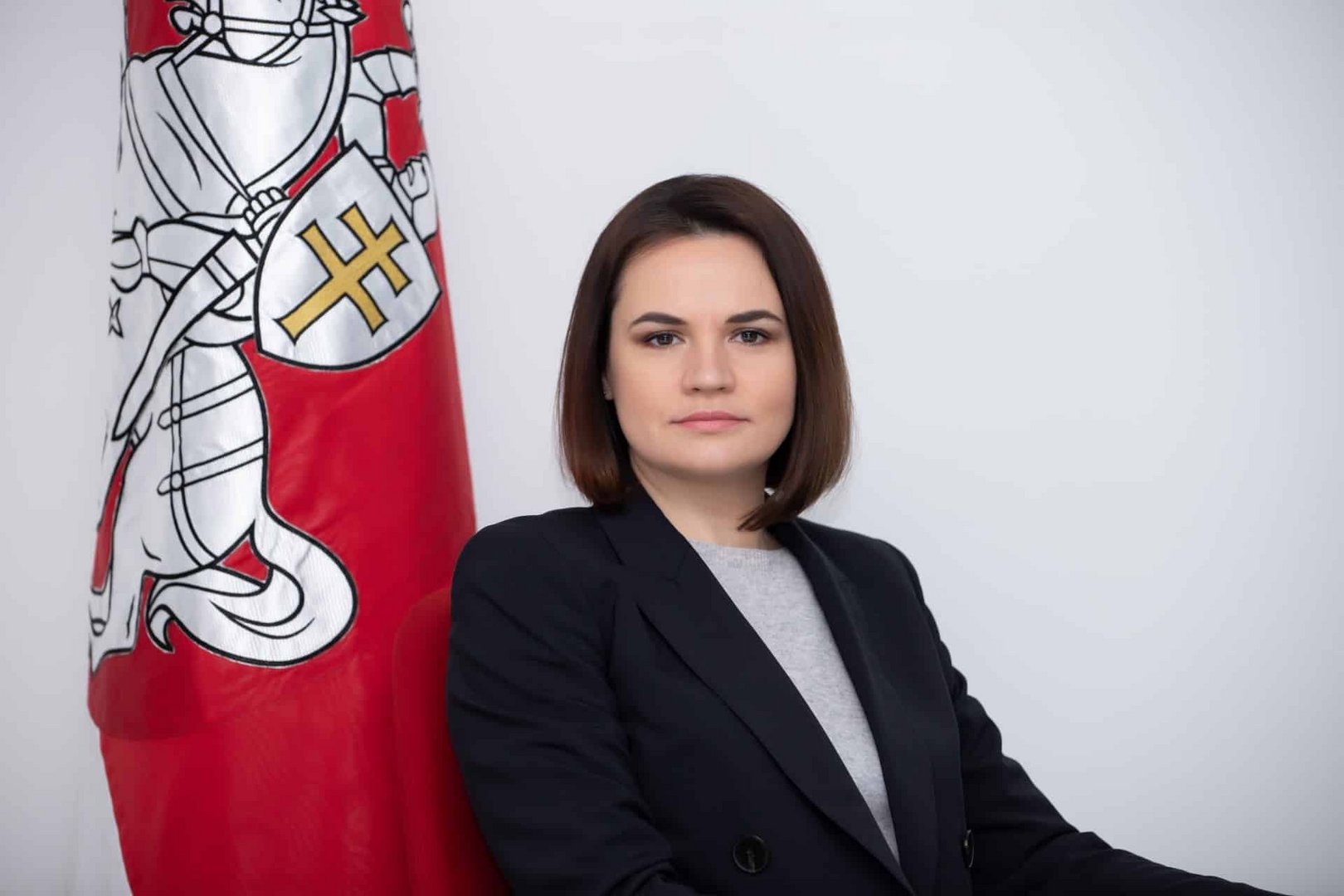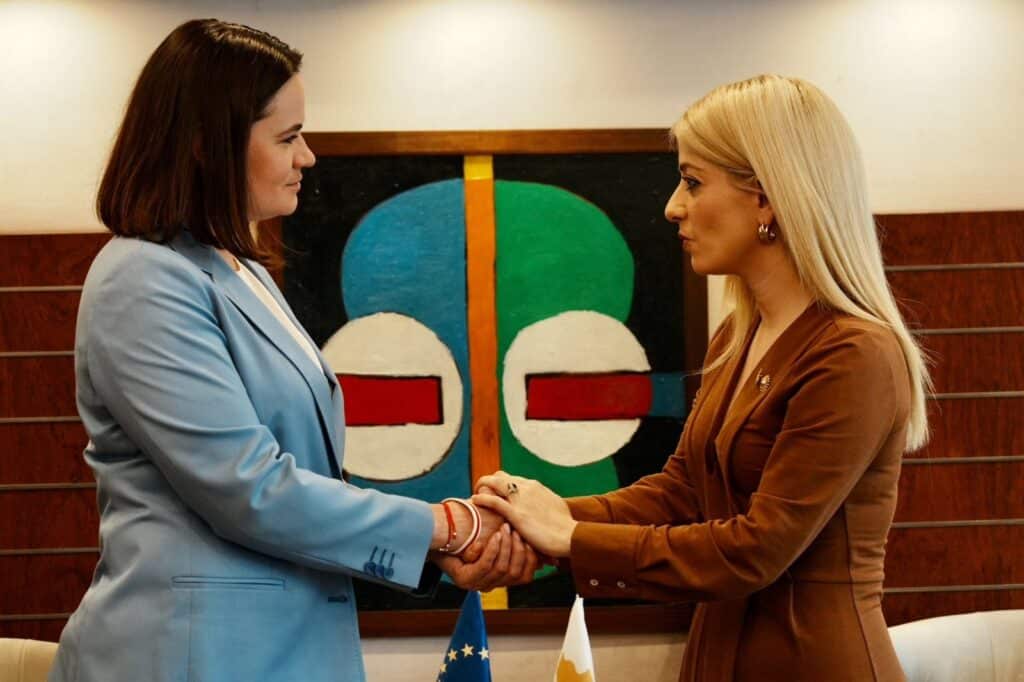Describing herself as an accidental politician, the head of Belarus’ government in exile was in Cyprus this week drumming up support against the country’s leader, who she accuses of wanting to erase everything Belarusian from Belarus
Head of the Transitional Cabinet of Belarus based in Lithuania, Sviatlana Tsikhanouskaya was in Cyprus on Wednesday as part of a campaign to rally support against the Belarus dictator Alexander Lukashenko, whom she accused of selling the country to Putin’s Russia for his survival.
“He is like the puppet of Putin,” Tsikhanouskaya told the Cyprus Mail. “He needs the support of Putin to survive, but to pay for this support Lukashenko is selling our country piece by piece to Russia, which interferes in our economy, military, education, media,” she said.
She accused Lukashenko, of “dragging us back to Soviet times,” and “wanting to erase everything Belarusian from Belarus.” And she has no doubt he is executing Russia’s order. “We have our own language, like Ukraine, but in schools they use Russian and our mother tongue is taught as a foreign language,” she said. “If you sing a Belarusian song you could get a jail sentence.”
The Lukashenko regime has been propped up by very cheap Russian loans while Russian businesses are taking over the economy. It is a form of occupation, Tsikhanouskaya said, “but it is difficult to show the democratic world that we are losing our country, we are losing our independence, because there were no signs of destruction.”
Russia has deployed nuclear weapons in Belarus not just to threaten Belarusians and neighbouring countries, “but because Putin “wants to secure the presence of Russia in our country for years.” He wants to “show I am here,” she said.
The 42-year-old Tsikhanouskaya has been leading the fight against the repressive Lukashenko regime since 2020, when she stood against him in presidential elections and was allegedly overwhelmingly defeated. Election monitor Golos and independent observers spoke about widespread electoral fraud and that she was the winner, although ‘officially’ she received only 10 per cent of the vote.
She only stood in the election because her husband, Syarhei Tsikhanouski, who was to have been the opposition candidate, was arrested along with other opposition leaders and could not officially submit his candidacy. He is currently serving an 18-year prison sentence – Amnesty International describes him as a prisoner of conscience.
After the 2020 elections, Tsikhanouskaya, who describes herself as an “accidental politician”, was given an ultimatum by the regime – either leave the country or face time in prison and have her two children put in a state orphanage. She moved to Lithuania, where she set up the Coordination Council of Belarus. Two years later, in August 2022, at a conference in Vilnius, she created the United Transitional Cabinet, which is referred to by governments in the West as the ‘government in exile,’ while she is known as the ‘president-elect’.
She was in Cyprus as the president-elect on Wednesday, meeting the president, the House president, speaking at a House foreign affairs committee and meeting EU ambassadors; she flew to Greece in the evening. This is part of a campaign to explain the plight of her country and promote the legitimacy of the government in exile.
“Our main mission is to formalise relations with governments and parliaments of other countries. We are a government in exile, our people are in Belarus,” she said. She has met most heads of government in the West, while the Council of Europe, the EU and the United States have recognised Tsikhanouskaya and her structures as legitimate representatives of Belarus. The Lukashenko regime declared her organisations extremist and in March 2023 she was tried in absentia and sentenced to 15 years in prison.
Apart from the West, she said she also wants “post-Soviet countries like Georgia, Armenia and Moldova to be on our side, because we have to defend our countries against the Russian empire.” In Belarus there was strong support for Ukraine after Russia’s invasion but this type of solidarity became a criminal offence, she said.
“You could end up in prison for supporting the Ukraine war effort, but people still found ways to help,” she said. “When Russian troops were on Belarus territory, Belarusians provided Ukrainians with information about the location and movement of these troops.” The Belarus regiment is the biggest foreign regiment fighting in Ukraine against Russia.
She concedes that in Belarus “you will not see people who are openly opposed to the regime or openly supporting Ukrainians, because we live like in Stalin’s time. Of course, they are afraid because if you oppose the regime, you could get 15, 20 years in prison.”
There are currently 1,500 political prisoners in Belarus and they are treated much worse than ordinary prisoners. “They are kept in special cells, routinely humiliated, deprived of food and water and are not allowed to communicate with anyone.” She cannot send her husband a parcel.
What was worse was the systematic harassment of the families of political prisoners, who have had their houses raided and searched while elderly parents are detained for days. “So many children of political prisoners live in exile at the moment,” she said, adding that there are about 500,000 Belarusians currently living abroad.
People are still mounting a resistance to the regime in their own way. “There are small acts of sabotage. We also have a network of volunteers and activists who provide insights and data as well as helping the families of the persecuted. For example, they also produce leaflets to keep the elderly who have no access to the internet informed.”
All this requires funding some of which comes from democratic funds and most of which goes to NGOs or human rights initiatives. There are also private donations from Belarusians and businesses – “honest businesses” she specifies – and we “hold marathons of solidarity which raise money from Belarusians.” This pays for lawyers for political prisoners and for their rehabilitation when they are released.
The government in exile also has to offer support to Belarusians who live abroad, after Lukashenko stopped all embassies and consulates issuing passports to them. “For example, if a person fled repression to live in Poland and his passport has expired, he would have to return to Belarus to have a new one issued, but when he returns, he will be detained,” said Tsikhanouskaya.
She said that now the Transitional Cabinet was working on creating “our own passport, something that nobody has ever done before,” adding that “we have to do this because very soon at least 500,000 (living abroad) will be stateless.”
And this, she points out “will not only be our problem but also your problem. We do not want our citizens to be a burden for European countries; we do not want them all to ask for political asylum.”
The issue of the passports and Schengen visas was brought up in her meeting with EU ambassadors in Nicosia. She asked that Belarusians should not require a visa every time they visited a Shengen zone country, because this was filling up the pages of passports which could not be renewed; she suggested one- or two-year visas from the EU. It is an administrative issue, the government in exile will have to tackle, a small part of a much bigger campaign.
“We have achieved a lot, in these four years, but we have not achieved our main goals – free elections in Belarus and the release of all political prisoners,” said Tsikhanouskaya, who does not give the impression of a woman who would ever give up this fight.








Click here to change your cookie preferences